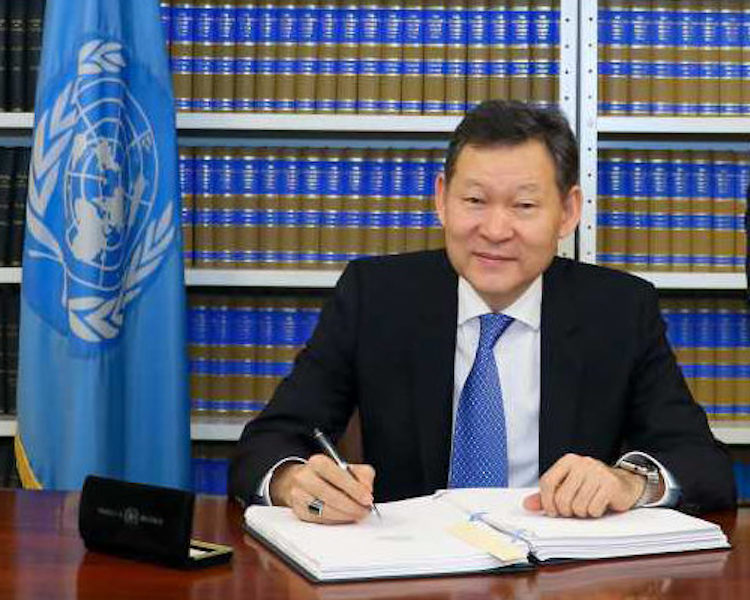By J Nastranis
UNITED NATIONS (IDN) – Kazakhstan, known as an active and staunch supporter of a world free of nuclear weapons, became 57th country to sign the Treaty on the Prohibition of Nuclear Weapons on March 2.
The Treaty, which opened for signature on September 20, 2017, will remain open indefinitely. It will enter into force 90 days after 50 nations have ratified or acceded to it. Until now, five states have ratified the Treaty: Guyana, Holy See and Thailand on September 20, 2017 immediately after signing. They were followed by Mexico on January 16 and Cuba on January 30.
Thirty days before Ambassador Kairat Umarov, Kazakhstan’s Permanent Representative to the UN, signed the Treaty, he held “wrap-up” session of the Security Council, which he chaired for the month of January.
Kazakhstan is the first Central Asian country to do so. It is also the first in the region to be elected to the 15-nation Security Council as a non-permanent member for the two-year period 2017-2018.
The wrap-up session reflected appreciation for Kazakhstan putting spotlight on non-proliferation of weapons of mass destruction and confidence building measures.
This was also the theme of Kazakh President Nursultan Nazarbayev’s address to the Security Council on January 18, in run up to the fiftieth anniversary of the UN inviting nuclear haves and have-nots to sign the Non-Proliferation Treaty (NPT) on July 1, 1968.
President Nazarbayev said the confidence building measures have proven their efficiency throughout the history. For example, they helped prevent the mass destruction in the second half of the 20th century, when humanity was on the verge of a new, large-scale war.
“To save subsequent generations from the scourge of war,” as the UN Charter vows, “is our common goal,” he said, adding: “Kazakhstan has proven its commitment to the goal by voluntary nuclear disarmament, which has been highly appraised by the world.”
As part of the now defunct Soviet Union, Kazakhstan had 1,410 Soviet strategic nuclear warheads placed on its territory and an undisclosed number of tactical nuclear weapons. One of the Soviet Union’s two major nuclear test sites was located at Semipalatinsk, where at least 460 nuclear tests took place. Kazakhstan relinquished its entire Soviet-era nuclear arsenal.
The Central Asian republic created a new model of international cooperation, Nazarbayev said, with the establishment of the IAEA Bank of Low Enriched Uranium in Kazakhstan, thus strengthening the non-proliferation regime.
Kazakhstan’s commitment to a nuclear weapons free world was also underlined by the establishment of a nuclear-weapon-free zone in Central Asia, and the declaration by the UN of August 29 as the International Day Against Nuclear Tests.
President Nazarbayev has also proposed the goal to achieve global elimination of nuclear weapons by 2045, the 100th anniversary of the founding of the United Nations.
The second session of the Preparatory Committee for the 2020 NPT Review Conference in April and the UN High-Level Conference on Nuclear Disarmament are significant steps for moving toward paving the way for a nuclear-weapons free world. [IDN-InDepthNews – 05 March 2018]
Photo: Ambassador Kairat Umarov, Kazakhstan’s Permanent Representative to the UN, signing the Nuclear Ban Treaty on March 2. Credit: Abolition2000
IDN is flagship agency of the International Press Syndicate.
facebook.com/IDN.GoingDeeper – twitter.com/InDepthNews

